Title: Exploring the HKU1 Coronavirus: Characteristics, Impact, and Insights
Introduction
In the realm of viral pathogens, the HKU1 coronavirus stands as a significant player. Amidst the well-known SARS-CoV-2 that sparked the COVID-19 pandemic, HKU1 remains relatively less discussed but is nonetheless an intriguing subject for researchers and health professionals. This article delves into the characteristics, impact, and insights surrounding the HKU1 coronavirus.
Characteristics of HKU1 Coronavirus
The HKU1 coronavirus, also known as HCoV-HKU1, is a member of the Betacoronavirus genus, the same group to which the SARS and MERS coronaviruses belong. Discovered in 2005 at the University of Hong Kong (hence the name "HKU1"), this virus primarily affects the respiratory system, causing a spectrum of symptoms from mild cold-like symptoms to more severe respiratory infections. Its genetic makeup consists of a single-stranded RNA molecule enveloped in a lipid membrane.
Genetic Structure and Variability
The genetic structure of HKU1 coronavirus displays a relatively high degree of variability. Like other RNA viruses, it undergoes frequent mutations, leading to the formation of distinct strains. These mutations contribute to the virus's ability to adapt and evade the host immune system. Despite its genetic diversity, HKU1 retains a core set of genes that facilitate its basic replication and infection mechanisms.
Clinical Presentation and Impact
HKU1 coronavirus primarily targets the human respiratory tract, causing a range of clinical presentations. Symptoms include fever, cough, sore throat, runny nose, and sometimes shortness of breath. While HKU1 infections are generally less severe than those caused by SARS-CoV-2, they can lead to complications in vulnerable populations such as the elderly, young children, and individuals with preexisting health conditions. Pneumonia and bronchiolitis are some of the more serious outcomes associated with HKU1 infections.
Epidemiology and Transmission
The HKU1 coronavirus is found worldwide, with varying prevalence in different regions and seasons. Like other coronaviruses, it spreads primarily through respiratory droplets produced when an infected person coughs or sneezes. Close contact with infected individuals and contaminated surfaces also contribute to transmission. While not as extensively studied as some other coronaviruses, HKU1 is believed to have a relatively low reproductive number, contributing to its generally milder impact compared to SARS-CoV-2.
Diagnosis and Treatment
Diagnostic methods for HKU1 coronavirus include molecular tests such as reverse transcription polymerase chain reaction (RT-PCR) assays. These tests detect the presence of viral genetic material in respiratory samples. As for treatment, there are no specific antiviral drugs designed exclusively for HKU1. Supportive care, including rest, hydration, and fever-reducing medications, is the mainstay of management for individuals with HKU1 infections.
Insights from HKU1 Research
Research on the HKU1 coronavirus not only expands our understanding of this particular virus but also provides broader insights into the biology and behavior of coronaviruses as a whole. Studying the genetic variability of HKU1 can shed light on the mechanisms of viral evolution and adaptation. Additionally, investigations into the immune response generated by HKU1 infections can inform vaccine development strategies and our understanding of immunity to related coronaviruses.
Conclusion
While the HKU1 coronavirus might not have garnered the same level of attention as its counterparts, its significance in the realm of respiratory viruses cannot be overlooked. Its genetic diversity, clinical impact, and potential insights into coronavirus behavior make it a compelling subject for ongoing research. As our understanding of coronaviruses continues to evolve, so too will our ability to mitigate their impact on public health.
Introduction
In the realm of viral pathogens, the HKU1 coronavirus stands as a significant player. Amidst the well-known SARS-CoV-2 that sparked the COVID-19 pandemic, HKU1 remains relatively less discussed but is nonetheless an intriguing subject for researchers and health professionals. This article delves into the characteristics, impact, and insights surrounding the HKU1 coronavirus.
Characteristics of HKU1 Coronavirus
The HKU1 coronavirus, also known as HCoV-HKU1, is a member of the Betacoronavirus genus, the same group to which the SARS and MERS coronaviruses belong. Discovered in 2005 at the University of Hong Kong (hence the name "HKU1"), this virus primarily affects the respiratory system, causing a spectrum of symptoms from mild cold-like symptoms to more severe respiratory infections. Its genetic makeup consists of a single-stranded RNA molecule enveloped in a lipid membrane.
Genetic Structure and Variability
The genetic structure of HKU1 coronavirus displays a relatively high degree of variability. Like other RNA viruses, it undergoes frequent mutations, leading to the formation of distinct strains. These mutations contribute to the virus's ability to adapt and evade the host immune system. Despite its genetic diversity, HKU1 retains a core set of genes that facilitate its basic replication and infection mechanisms.
Clinical Presentation and Impact
HKU1 coronavirus primarily targets the human respiratory tract, causing a range of clinical presentations. Symptoms include fever, cough, sore throat, runny nose, and sometimes shortness of breath. While HKU1 infections are generally less severe than those caused by SARS-CoV-2, they can lead to complications in vulnerable populations such as the elderly, young children, and individuals with preexisting health conditions. Pneumonia and bronchiolitis are some of the more serious outcomes associated with HKU1 infections.
Epidemiology and Transmission
The HKU1 coronavirus is found worldwide, with varying prevalence in different regions and seasons. Like other coronaviruses, it spreads primarily through respiratory droplets produced when an infected person coughs or sneezes. Close contact with infected individuals and contaminated surfaces also contribute to transmission. While not as extensively studied as some other coronaviruses, HKU1 is believed to have a relatively low reproductive number, contributing to its generally milder impact compared to SARS-CoV-2.
Diagnosis and Treatment
Diagnostic methods for HKU1 coronavirus include molecular tests such as reverse transcription polymerase chain reaction (RT-PCR) assays. These tests detect the presence of viral genetic material in respiratory samples. As for treatment, there are no specific antiviral drugs designed exclusively for HKU1. Supportive care, including rest, hydration, and fever-reducing medications, is the mainstay of management for individuals with HKU1 infections.
Insights from HKU1 Research
Research on the HKU1 coronavirus not only expands our understanding of this particular virus but also provides broader insights into the biology and behavior of coronaviruses as a whole. Studying the genetic variability of HKU1 can shed light on the mechanisms of viral evolution and adaptation. Additionally, investigations into the immune response generated by HKU1 infections can inform vaccine development strategies and our understanding of immunity to related coronaviruses.
Conclusion
While the HKU1 coronavirus might not have garnered the same level of attention as its counterparts, its significance in the realm of respiratory viruses cannot be overlooked. Its genetic diversity, clinical impact, and potential insights into coronavirus behavior make it a compelling subject for ongoing research. As our understanding of coronaviruses continues to evolve, so too will our ability to mitigate their impact on public health.




